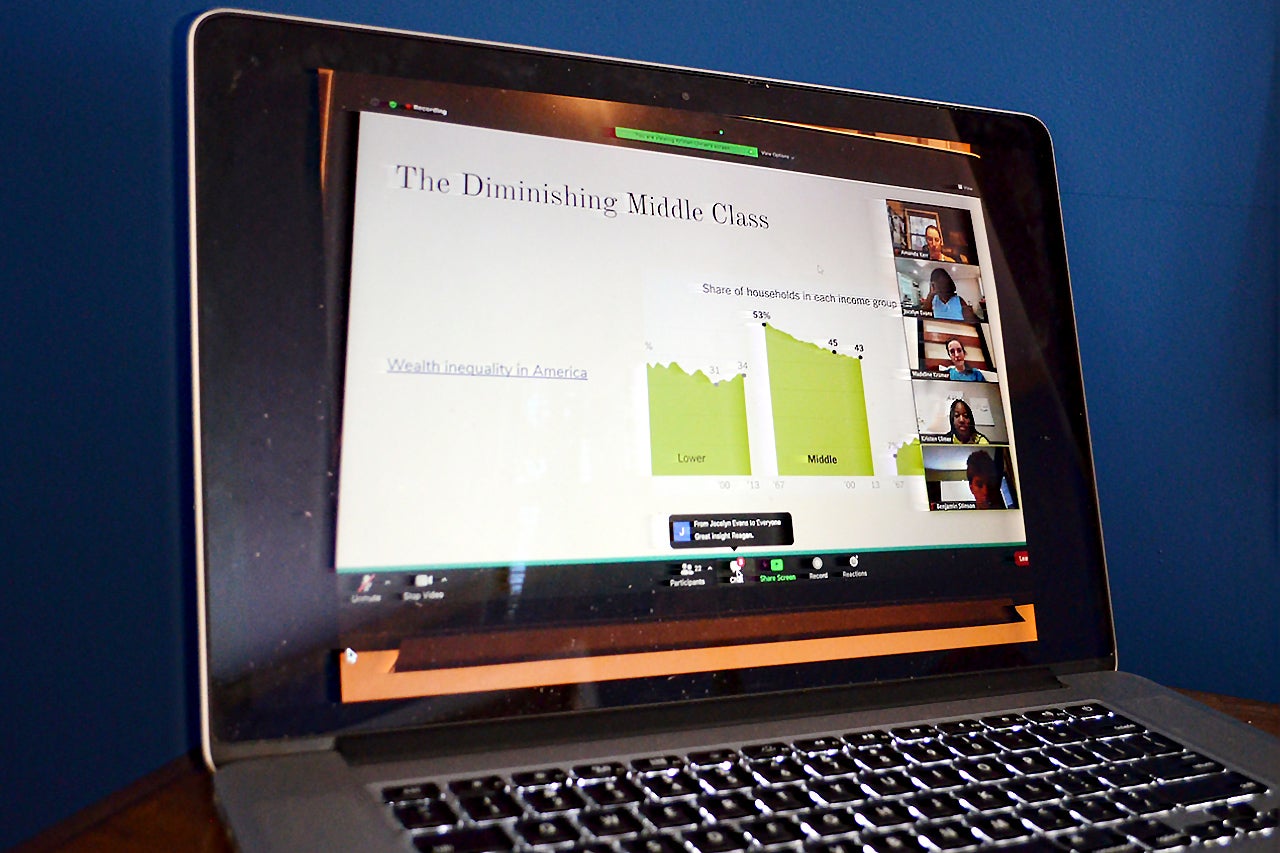Don’t turn off your Zoom camera and zone out in Jocelyn Evans’ Financial Literacy for Generation Z class: You never know when she’s going to call on you.
And that approach is by design, says Evans, a finance professor and associate dean of the College of Charleston’s School of Business. Otherwise, it’s too tempting for students to log on to an online course like this one and not pay attention or hold back from engaging in class discussions. Due to the pandemic, approximately 35% of the College’s classes are entirely online this semester, with many other courses relying heavily on digital platforms and online instruction to accommodate reduced classroom capacities for social distancing.
“Normally, we’d be in a classroom sitting next to each other, and you can see when someone wants to ask a question,” says Evans. “In Zoom, you need that first person to ask a question, and it doesn’t happen as organically.”
So, Evans doesn’t wait for students to ask questions. She asks them questions instead – calling on each and every student who is signed in for class that day.
“What do you think about the differences between the gender wage gap?” Evans asks one student during a recent Tuesday morning class. “Like, women make less than men, and then if you look at the demographics of women, African American and Hispanic women make way less than white women. What do you think about that? What is driving that?”
From there, the class discussion unfolds with students either answering questions when Evans calls their names or sharing thoughts on Zoom’s chat feature – something that students say they like because they can speak up online without interrupting someone else or awkwardly trying to get a professor’s attention to share a thought.
“I think with this class, it’s a lot easier to make discussion points because we use the chat feature, and she’s always looking at the chat and making sure your point is heard,” says Caterina Ypsilantis, a freshman majoring in communication. “And once you say something, she asks you about it.”
In fact, Evans simultaneously talks with students on Zoom while monitoring comments coming through the chat feature and uses those remarks to shape the next topic of discussion.
“I think it works well because, if someone is making a point and you have something to add on, you can just type it in the chat so that you don’t forget it, and then someone will come back to you later,” says freshman Max Teas.

Students in the Financial Literacy for Generation Z class give a presentation on gender and racial income inequality using Zoom.
Evans has structured this first-year experience seminar to focus more on small group projects and research offline as a way to ensure students interact with each other, which is essential since it can be harder for students to connect in an online class setting.
On this particular day, students Kristen Ulmer, Madeline Kramer and Ben Stinson share their presentation on the gender wage gap, including statistics, trends and insights into why women make less than their male counterparts and how that effects their financial standing and habits.
“Job loss for women during the COVID-19 pandemic appears to be significantly higher, especially in industries like hospitality and tourism, retail, salons and airlines, which could further increase the gender pay gap,” explains Ulmer, a first-year student who is majoring in biology.
Having to engage with financial topics with her group outside of class was helpful both in terms of better understanding the material and developing more of rapport with her classmates, says Ulmer, who is taking all of her courses online this semester.
“When listening to the information being taught to us, I thought I fully understood the topic. But after doing research for the topic I was able to answer questions I didn’t even know I had,” she says, adding: “I did feel more connected to my classmates by having to work with them. By doing a group project, it’s almost like a conversation starter. It gives us a reason to communicate.”
Evans also carves out time to develop one-on-one relationships with students, too, through office hours via Zoom. She’s also held a socially distanced coffee hour for students and regularly offers to meet for lunch on campus at Liberty St. Fresh Food Company.
That accessibility and personal attention is something that really helps keep students motivated during a semester when so many elements of classes are being delivered online.
“Staring at a screen and listening to a lecture online can really challenge our attention span,” says Ulmer. “Dr. Evans is great at making me feel included in the class. I do appreciate that she is more than willing to Zoom with us outside of regular class sessions if we need topics or a project explained to us. She is available almost anytime.”
Just like for her students, Evans says she has to put in the time to get the most out of the class.
“It’s way more work than a face-to-face class,” says Evans. “But the effort is worth it if they can take what they learn in my class and use that same skill set and do their work for their other classes.”
That’s why it’s important to pay attention.





